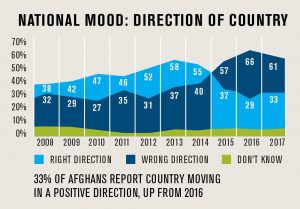Optimism Rises among Afghan people: Asia Foundation

According to a survey released Tuesday by the Asia Foundation, the number of Afghans who say the country is moving in the right direction has increased and optimism has risen slightly, reversing a decade-long downward trajectory in national mood.
At the same time, fears about security and the economy affect attitudes about the country’s future, and a large number of respondents indicate they would leave the country if afforded the opportunity.
The findings are based on face-to-face interviews with a national sample of more than 10,000 Afghan citizens representing ethnic groups in all 34 provinces. Quoted from Business Wire.
The survey shows that in 2002, Afghanistan had one million students; today it has 8.7 million, 39% of them females and life expectancy at birth has increased from 45.3 years in 2000 to 60.7 years in 2017.
“Clearly, Afghans are eager for a better future, and this year’s data reflects a rise in optimism despite the challenging security environment and lack of employment,” said Abdullah Ahmadzai, the Asia Foundation’s country representative in Afghanistan.
“The Survey is a map of social change over time, presenting a clear picture of the gains and gaps that Afghans perceive in a rapidly transforming nation,” said David D. Arnold, president of the Asia Foundation. “In this crucial period of political and economic transition, the importance of comprehensive, reliable data cannot be overstated.”
Rise in optimism despite violence, insurgencies, unemployment
32.8% of Afghans say their country is moving in the right direction, reversing a downward trend in mood that began in 2013. A desire to rebuild (51.0%) contributed to the slight rise in optimism.
Afghans who say the country is moving in the wrong direction declined to 61.2% from a 2016 high of 65.9%. Drops in fear were recorded in the East and South West, but in the West fear for personal safety spiked from 67.5% in 2016 to 80.2% in 2017. Consistent with 2016, 70.6% of Afghans say the biggest problem facing youth is unemployment; this is particularly pronounced in the Kabul, the capital (76.8%).
Insecurity top reason for Afghans willing to migrate
38.8% of Afghans would leave the country if afforded the opportunity—the second-highest level recorded in Survey history. Men (41.2%) are more likely than women (36.3%) to wish to leave Afghanistan. An increase in casualty deaths, clashes, and attacks in Kabul have combined to strongly influence the willingness to leave—76.3% cite insecurity as a top reason to leave followed by unemployment at 54.5%.
Those who want to stay report “this is my country” and “I feel comfortable here.”
Confidence in Afghan National Security Forces
Attitudes toward the Afghan National Police (ANP) and Afghan National Army (ANA) have stabilized in 2017, which after 2014 sharply declined in all categories assessed by the Survey.
Public institutions and government performance
After a historic decline in 2016, confidence in public institutions has improved; some remain skeptical about leaders’ abilities to improve living conditions.
Afghans support women’s leadership and education
Women are more visible in the news media and broadcast television, but support for women in leadership roles is mixed. Most Afghans (69.7%) agree women should be able to join a community development council; a record 91.5% said women should have the same opportunities as men in education; 82.3% say this in 2017.
The Asia Foundation is an international development nonprofit organization committed to improving lives across a dynamic and developing Asia, began working in Afghanistan in 1954 and re-opened its Kabul office in 2002.